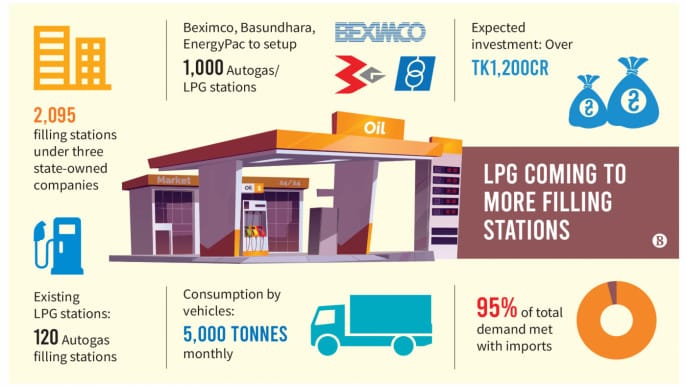Liquefied petroleum gas (LPG) is likely to be the main driving force for vehicles on the road.
And Bangladesh’s three conglomerates are going to set up 1,000 autogas filling stations across the country.
Beximco, Bushundhara, and Energypac will launch these stations at the petrol pumps of the state-owned oil distribution companies.
The government is also encouraging new investment in the area as an alternative to dirty fuel.
Autogas is LPG and is already a highly popular and admired fuel solution across the world for being energy efficient and environmentally friendly.
The use of LPG as auto fuel is growing in Bangladesh too due to its cost competitiveness compared to octane, petrol or diesel.
And amid the rising concern about climate change, the government wants to cut the octane, petrol or diesel consumption footprint in the country.
It is also prioritising a transition to green fuel from the hazardous oil as part of its election pledges.
LPG business started in Bangladesh as autogas in 2005 when Australia-based Petredec Elpiji set up the country’s first filling station.
Now there are around 120 autogas filling stations across the country with an annual demand of 60,000 tonnes of LPG.
Beximco Group, one of the largest conglomerates in Bangladesh, plans to set up 500 auto LPG stations across the country.
The conglomerate signed two separate agreements with Padma Oil Company Limited and Meghna Petroleum Limited – subsidiaries of the Bangladesh Petroleum Corporation – to set up LPG pumps and start the sale of autogas through the registered filling stations of Meghna Petroleum.
Earlier, Beximco officials told the media the estimated cost of the project would be around Tk1,000 crore when they were given the nod to set up the filling stations for conversion workshops.
Beximco LPG CEO Mrinal Roy said in a statement, “This is a milestone for the LPG sector of the country and will ensure the spread of LPG autogas across the country.”
“Beximco LPG commits delivery of the highest-quality LPG mix of propane and butane to ensure that the fuel reaches the required octane number and causes no damage to the engine of the vehicle.”
Bashundhara LP Gas Limited also entered into the same agreement with Meghna Petroleum on Thursday.
Bashundhara LP General Manager Zakaria Jalal and Meghna Petroleum Managing Director Mir Saifullah Al Khaled signed the agreement.
Zakaria said, “We plan to set up 400 autogas filling stations across the country and will ink the same agreement with Padma Oil and Jamuna Oil next week.”
On September 2, state-owned petroleum distributor Padma Oil signed an agreement with Energypac Power Generation Limited to sell the latter’s LPG.
Energypac Power Generation Managing Director Humayun Rashid told The Business Standard, “Primarily, we selected 100 filling stations of Padma Oil across the country to sell our LPG under the brand name G gas.”
“We also plan to set up our own refuelling stations but need more time for that.”
As per the agreements, state-owned oil distribution companies Padma, Meghna and Jamuna will receive royalties of Tk0.50 for sale of per litre of LPG from each private venture.
Bangladesh Petroleum Corporation Chairman Md Shamsur Rahman said they are supporting the use of LPG to cut fossil fuel dependency.
“Autogas filling stations will be set up at each filling station based on their capacity. Every private investor will have separate space at the stations.”
Bangladesh’s LPG market is import-dominated as more than 60% of cylinders and 95% of the country’s total demand are met this way, Shamsur Rahman said.
Also, LPG gas is becoming popular as cooking fuel in Bangladesh which already has an annual demand of 7 lakh metric tonnes.

